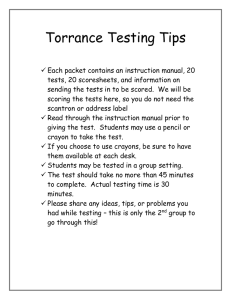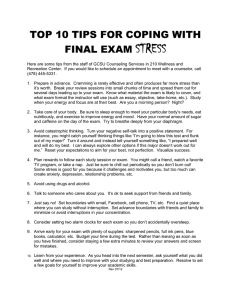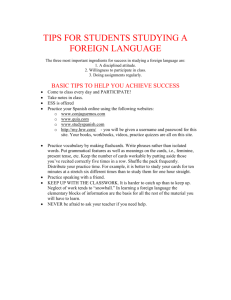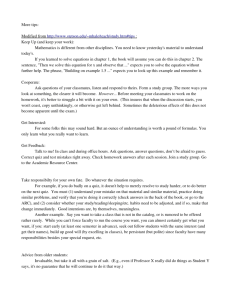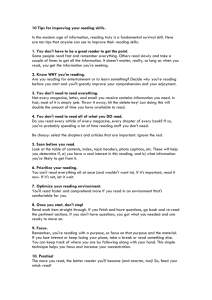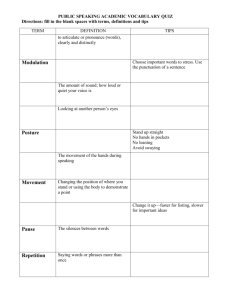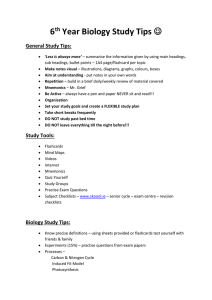Study/Test Taking Tips
advertisement
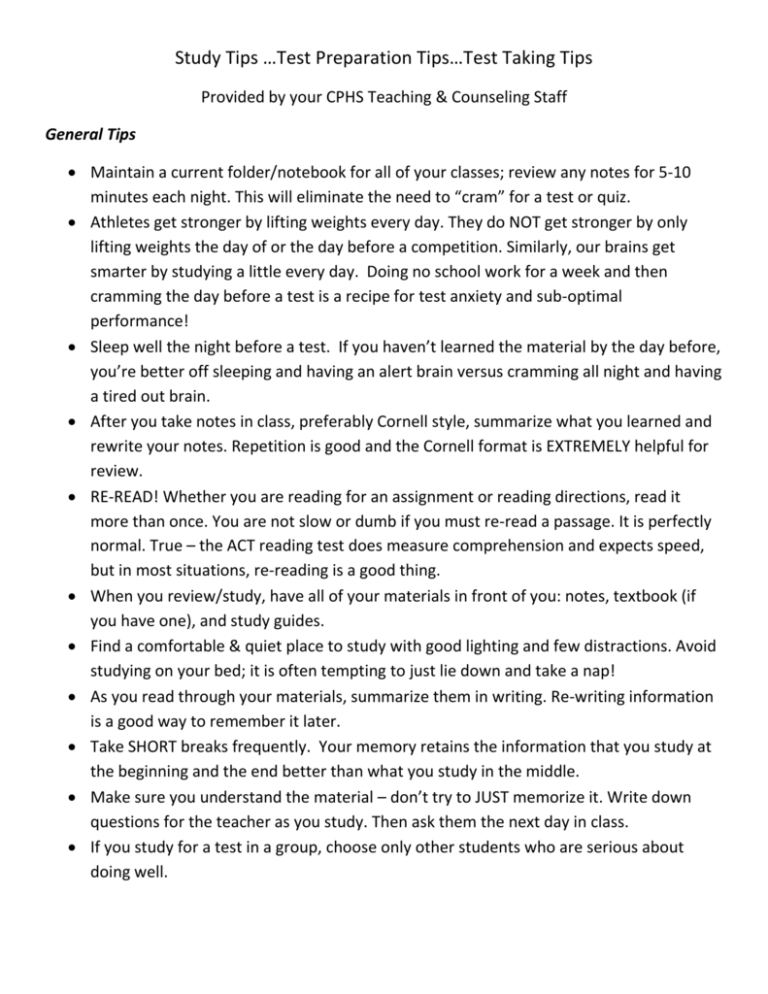
Study Tips …Test Preparation Tips…Test Taking Tips Provided by your CPHS Teaching & Counseling Staff General Tips Maintain a current folder/notebook for all of your classes; review any notes for 5-10 minutes each night. This will eliminate the need to “cram” for a test or quiz. Athletes get stronger by lifting weights every day. They do NOT get stronger by only lifting weights the day of or the day before a competition. Similarly, our brains get smarter by studying a little every day. Doing no school work for a week and then cramming the day before a test is a recipe for test anxiety and sub-optimal performance! Sleep well the night before a test. If you haven’t learned the material by the day before, you’re better off sleeping and having an alert brain versus cramming all night and having a tired out brain. After you take notes in class, preferably Cornell style, summarize what you learned and rewrite your notes. Repetition is good and the Cornell format is EXTREMELY helpful for review. RE-READ! Whether you are reading for an assignment or reading directions, read it more than once. You are not slow or dumb if you must re-read a passage. It is perfectly normal. True – the ACT reading test does measure comprehension and expects speed, but in most situations, re-reading is a good thing. When you review/study, have all of your materials in front of you: notes, textbook (if you have one), and study guides. Find a comfortable & quiet place to study with good lighting and few distractions. Avoid studying on your bed; it is often tempting to just lie down and take a nap! As you read through your materials, summarize them in writing. Re-writing information is a good way to remember it later. Take SHORT breaks frequently. Your memory retains the information that you study at the beginning and the end better than what you study in the middle. Make sure you understand the material – don’t try to JUST memorize it. Write down questions for the teacher as you study. Then ask them the next day in class. If you study for a test in a group, choose only other students who are serious about doing well. Specific Courses English: Read difficult texts daily. Read closely and identify the main point of each paragraph. For writing assessments (in ELA, Social Studies or ANY class), create a plan BEFORE you begin writing. Organize your notes and use an outline, web or other graphic organizer to prepare the ideas you will include in the paper. You can also just jot down ideas in list form to start and then organize them into an outline. Foreign Language: Prepare for vocabulary tests with flashcards. During a test, try to think of how the word is used in the sentence if you cannot remember the translation. Health: Make flashcards or foldables to study vocabulary. Math: Practice a “test like” setting. Try solving the problems WITHOUT the aid of notes or the book. If you get stuck, look it up and then find another similar problem to try solving without notes. Many students will ask the teacher how to do something, but after being shown, never go back and try it on their own. They have a false sense that they “know” it, but SEEING someone else solve the problem is different than solving it yourself! This works well with GRAMMAR too! See your math teacher during seminar the day of the test (or before school if you have math first hour). You can ask a few questions and do a quick review. This will help keep the material fresh in your mind and reduce anxiety. Science: Complete review sheets and quiz another student with the sheet – then have that student quiz you. Use cardstock to make a set of terms and another set with the definitions. Then create a “matching” simulation. This works better because you have to recognize the definitions when they are all mixed up instead of just reciting one at a time. If the teacher runs an extra review before every test, ATTEND THE REVIEW SESSION! This is offered by some teachers in the building and few students take advantage of it! Social Studies: If possible, WRITE on the test. Underline key words or cross out incorrect answer options as you eliminate them. Make notes or draw graphic organizers in the margins. These strategies are especially useful for visual learners. When creating study cards, use a picture to remind you of what the word means and always put the definition in your own words. Tips for Test Taking Preview the test questions before you begin answering them. Answer the ones you know first; then go back to the others. Make note of the point value of different questions, as there is no point wasting your limited time on answers you don’t know and that have a low point value. When taking a reading test, READ THE QUESTIONS FIRST. This will help you have a purpose in mind as you are reading. This applies to the ACT and other standardized tests as well. Eat breakfast and lunch! Whether your test is during a morning class or an afternoon class, your blood sugar will be up, which will help you stay more alert during the test. Ask for a quiet, separate place if you feel pressured by others who quickly turn in their tests. Be sure that you know how many questions there are and check that you have answered them all before turning in your test. Slow down and read directions. Read each question closely – simple mistakes are often made from rushing to an answer or missing key words such as EXCEPT. If you are unsure of an answer, skip the item temporarily and go back to it later. Often a question in the middle or at the end of a test will jog your memory about the question you skipped and can help you to answer the item when you go back to it. Use process of elimination for multiple choice questions; it increases your odds of answering correctly. For multiple choice tests that use a scantron sheet, write the answer on the test booklet first (you may want to ask your teacher for permission to write on the test), then bubble in the answer on the scantron sheet. Before you turn in your test, double check that you filled in the letters you intended to choose. On the ACT essay or any part of the MME that requires you to write an essay in which you take a position, be sure to use the word because when offering support. The people grading the test are not always educators, and this is a key word they look for to give points to students.
